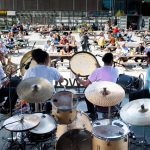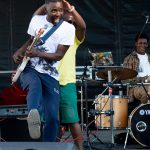The hybrid event featured CAN (Community Arts North West), the University of Manchester and European refugee arts networks from Germany, France, Portugal and the UK.
Attended by 150 delegates from 20 countries – Africa, The Americas, South Asia, Australia, and Europe – the panel brought together refugee creative, networks, artists and cultural workers, academics, policy specialists and human rights activists, and grassroots organisations from the UK, France, Germany, and Portugal to discuss performing arts and refugeedom
The panel facilitated an open conversation on the role of networks in advocating change on various artistic and institutional levels, aiming to build alliances across research and the creative sector within and outside the UK.
The discussion aimed to increase visibility and opportunities for refugee artists and groups, to share experiences and practices across geographic and cultural settings.
“It was important to hear experiences from artists outside the UK.”
Lara Parmiani, Legal Aliens Theatre, London
The panel posed several questions:
What are the strategies and challenges faced by refugee artists today? How can networks foster systemic change? How can we develop new frameworks driven by the artistic visions created by refugee artists?
Dr Szabolcs Musca, University of Bristol, wrote a report as a legacy of the event.
Participating networks
Migrants in Theatre, UK is a movement made up of first-generation migrant theatre artists and theatre companies who joined efforts to campaign for more and better representation of UK-based migrant theatre artists, administrators, and board members in British theatre.
The movement comprises artists from a broad and diverse range of backgrounds and experiences and is open to migrant theatre-makers in a multitude of roles, from actors, directors, set designers, playwrights, to stage managers, arts administrators, and board members.
Mena Arts, UK is a new arts organisation for UK-based professionals who are connected to the MENA+ region (Middle East, North Africa, and the surrounding area).
Agency Of Artists in Exile, France (aa-e) works to identify artists in exile from all origins and disciplines, accompanies them according to their situations and their needs, provides them with workspaces, and puts them in contact with professionals in France and Europe.
Postheimat Network, Germany is a continuously developing and progressing network in the field of performing arts, addressing the topics of migration, refuge, identity, multilingualism, and power structures within artistic practices and institutions.
Una-Union Of Black Artists, Portugal UNA’s main objectives are the promotion, elevation, and strengthening of black representation in the Portuguese arts sector, as well as the recognition and enhancement of the intangible heritage of the black population in Portugal.
Panelists
Khaled Alwarea (Agency of Artists in Exile, France)
Born in 1988 in Damascus, Syria, Khaled Alwarea is an architect and multidisciplinary artist. His work varies between installation, visual art, photography, sculpture, filmmaking, scenography, and interior design. In 2014, he founded the design studio UV LAB and carries out projects for the Middle East and Europe dedicated to the refugee crisis and equitable access to educational facilities for disadvantaged youth.
Ramzi DeHani (MENA Arts, UK)
Ramzi is an actor and artist from London. He trained at the Oxford School of Drama and has worked across stage, screen, and radio both in the UK and internationally. He is the co-founder of MENA Arts UK, an arts organisation for UK-based artists and creatives connected to the Middle East and North Africa.
Judith Depaule (Agency of Artists in Exile, France)
Director and co-founder of the agency of artists in exile with Ariel Cypel, she is first and foremost a theatre director. In 2001, she founded the company Mabel Octobre, creating mostly her writings and shows based on the double axis of investigation and multimedia.
Lanna Joffrey (MENA Arts/ Migrants in Theatre, UK)
Lanna Joffrey is an award-winning Iranian actor/writer who has trained and worked in the UK and US. Her critically acclaimed verbatim docudrama Valiant has toured throughout the UK/US and was published this year by NoPassport Press.
Lubanzadyo Mpemba (UNA – Union of Black Artists, Portugal)
He is an Angolan-born artist who works mainly with video art, photo performance, performance, and documentary. His work focuses on issues of migration, urban gentrification, institutional violence, and collective memory.
Lara Parmiani (Migrants in Theatre, UK)
Lara is an Italian-born actor, director, theatre-maker, and facilitator. She studied dramaturgy at Universita’ Cattolica in Milan and acting at Guildhall in London. She is Artistic Director of LegalAliens Theatre, a co-founder of Migrants in Theatre, and directed and devised work with LegalAliens community group.
Anabela Rodrigues (UNA- Union of Black Artists, Portugal)
Better known as Belinha, she is an activist and writer, who also works as a cultural mediator with an immigrant organisation in Lisbon, Portugal. Her work is linked to the Theatre of the Oppressed and since 2012, together with the AMI-AFRO group she works on forum theatre performances nationally and internationally.
Jonas Tinius (PostHeimat Network, Germany)
Jonas Tinius is a Postdoctoral Researcher and Scientific Coordinator of the ERC project Minor Universality: Narrative World Constructions After Western Universalism and the Associate Member of the Centre for Anthropological Research on Museums and Heritage at Humboldt-Universität zu Berlin. His ethnographic research grapples with the tensions between art, nation, identity, migration, and colonial legacies in Europe.
Ruba Totah is an anthropologist at the Johannes Gutenberg University Mainz. Her research interest and writing cover cultural activism, transnationalism, and gender across Palestine, the Arab area, and Europe.
Curated by
Stella Barnes (Community Arts North West, UK), Alison Jeffers (University of Manchester), Dr Szabolcs Musca (Migrant Dramaturgies Network/ New Tides Platform)
Organisers
The Drama Department, University of Manchester has a strong history of research around issues of migration, refugeedom, asylum, and their connections to a range of art practices. Initiated by the In Place of War project (2004 – 2008) this research trajectory was continued by Dr Alison Jeffers who has published several works in this field. A successful bid for AHRC funds in 2020 led to the research project – Listening to the Voices of Refugee Artists – now being carried out by Ambrose Musiyiwa. This is a collaborative doctoral award with CAN in Manchester.
CAN is a long-established Manchester-based arts organisation and Arts Council England National Portfolio Organisation. It builds deep, long-lasting connections with communities across Greater Manchester, developing unique, creative projects with people whose voices are not normally heard in the mainstream. CAN has led the field in community arts since 1978 and is at the cutting edge of intercultural arts practice. We have expertise and interest in arts and migration. Through exciting and high-quality creative projects with artists, communities, and young people, CAN shares powerful creative work; shining a light on new talent and fresh voices, and enriching Greater Manchester’s cultural landscape. CAN’s work is firmly rooted in social justice and driven by ethical values.
Migrant Dramaturgies Network (MDN) is a transnational collective of theatre professionals, researchers, and cultural workers that forms part of New Tides Platform, an independent organisation working on cross-cultural exchanges in performing arts.
MDN is a platform for exchange and knowledge sharing between thinkers, theatre-makers, and organisations involved in migrant theatre on various levels of artistic and cultural creation and development. As a collaborative venture, we facilitate research programmes as well as arts & cultural projects together with international partners and theatre-makers to bring together a diversity of perspectives and expand understanding of migration and theatre.




